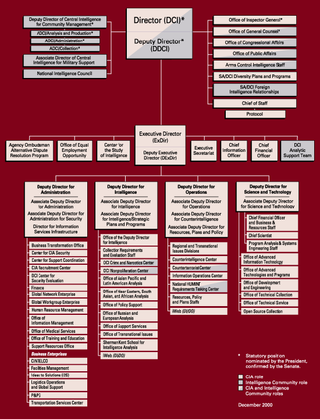
The Office of National Assessments (ONA) was an Australian statutory intelligence agency established by the Office of National Assessments Act 1977 as an independent statutory body directly accountable to the Prime Minister of Australia as a portfolio agency of the Department of the Prime Minister and Cabinet. ONA provided all-source assessments on international political, strategic and economic developments to the Prime Minister and the National Security Committee of Cabinet. ONA also played a coordination role in the Australian Intelligence Community through evaluating foreign intelligence products, convening the National Intelligence Coordination Committee, and developing relationships with intelligence agencies around world.

The National Geospatial-Intelligence Agency (NGA) is a combat support agency within the United States Department of Defense whose primary mission is collecting, analyzing, and distributing geospatial intelligence (GEOINT) in support of national security. Initially known as the National Imagery and Mapping Agency (NIMA) from 1996 to 2003, it is a member of the United States Intelligence Community.
Open source intelligence (OSINT) is the collection and analysis of data gathered from open sources to produce actionable intelligence. OSINT is primarily used in national security, law enforcement, and business intelligence functions and is of value to analysts who use non-sensitive intelligence in answering classified, unclassified, or proprietary intelligence requirements across the previous intelligence disciplines.

Defence Intelligence (DI) is an organisation within the United Kingdom intelligence community which focuses on gathering and analysing military intelligence. It differs from the UK's intelligence agencies in that it is an integral part of a government department – the Ministry of Defence (MoD) – rather than a stand-alone organisation. The organisation employs a mixture of civilian and military staff and is funded within the UK's defence budget. The organisation was formerly known as the Defence Intelligence Staff (DIS), but changed its name in 2009.

The Director of National Intelligence (DNI) is a senior, cabinet-level United States government official, required by the Intelligence Reform and Terrorism Prevention Act of 2004 to serve as executive head of the United States Intelligence Community (IC) and to direct and oversee the National Intelligence Program (NIP). All IC agencies report directly to the DNI. The DNI also serves, upon invitation, as an advisor to the president of the United States, the National Security Council and the Homeland Security Council on all intelligence matters. The DNI, supported by the Office of the Director of National Intelligence (ODNI), produces the President's Daily Brief (PDB), a classified document including intelligence from all IC agencies, handed each morning to the president of the United States.

The United States Intelligence Community (IC) is a group of separate United States government intelligence agencies and subordinate organizations that work both separately and collectively to conduct intelligence activities which support the foreign policy and national security interests of the United States. Member organizations of the IC include intelligence agencies, military intelligence, and civilian intelligence and analysis offices within federal executive departments.

The United States Senate Select Committee on Intelligence is dedicated to overseeing the United States Intelligence Community—the agencies and bureaus of the federal government of the United States that provide information and analysis for leaders of the executive and legislative branches. The Committee was established in 1976 by the 94th Congress.

The Bureau of Intelligence and Research (INR) is an intelligence agency in the United States Department of State. Its central mission is to provide all-source intelligence and analysis in support of U.S. diplomacy and foreign policy. INR is the oldest civilian element of the U.S. Intelligence Community and among the smallest, with roughly 300 personnel. Though lacking the resources and technology of other U.S. intelligence agencies, it is "one of the most highly regarded" for the quality of its work.

The Defence Intelligence Organisation (DIO) is an Australian government military intelligence agency responsible for strategic intelligence and technical intelligence assessments, advising defence and government decision-making on national security and international security issues, and the planning and conduct of Australian Defence Force operations. The DIO does not collect intelligence or conduct covert action, but works on defence economics, transnational terrorism, and WMD.

The Foreign Broadcast Information Service (FBIS) was an open source intelligence component of the Central Intelligence Agency's Directorate of Science and Technology. It monitored, translated, and disseminated within the U.S. government openly available news and information from media sources outside the United States. Its headquarters was in Rosslyn, later Reston, Virginia, and it maintained approximately 20 monitoring stations worldwide. In November 2005, it was announced that FBIS would become the newly formed Open Source Center, tasked with the collection and analysis of publicly available intelligence.

The Directorate of Operations (DO), less formally called the Clandestine Service, is a component of the US Central Intelligence Agency. It was known as the Directorate of Plans from 1951 to 1973; as the Directorate of Operations from 1973 to 2005; and as the National Clandestine Service (NCS) from 2005 to 2015.

The National Center for Medical Intelligence (NCMI), formerly known as the Armed Forces Medical Intelligence Center, is a component of the United States Defense Intelligence Agency (DIA) responsible for the production of medical intelligence and all-source intelligence on foreign health threats and other medical issues to protect U.S. interests worldwide. Headquartered at Fort Detrick, Maryland, the center provides finished intelligence products to the Department of Defense, U.S. Intelligence Community, Five Eyes, NATO, allies and partners, as well as international health organizations and NGO's.

The Central Intelligence Agency, known informally as the Agency and historically as the Company, is a civilian foreign intelligence service of the federal government of the United States, officially tasked with gathering, processing, and analyzing national security information from around the world, primarily through the use of human intelligence (HUMINT) and conducting covert action through its Directorate of Operations. As a principal member of the United States Intelligence Community (IC), the CIA reports to the Director of National Intelligence and is primarily focused on providing intelligence for the President and Cabinet of the United States. Following the dissolution of the Office of Strategic Services (OSS) at the end of World War II, President Harry S. Truman created the Central Intelligence Group under the direction of a Director of Central Intelligence by presidential directive on January 22, 1946, and this group was transformed into the Central Intelligence Agency by implementation of the National Security Act of 1947.

Eliot A. Jardines was the first Assistant Deputy Director of National Intelligence for Open Source (ADDNI/OS) in the United States.
The Open Source Enterprise (OSE) is a United States Government organization dedicated to open-source intelligence. Initially part of the Office of the Director of National Intelligence, it is now part of the Directorate of Digital Innovation at the Central Intelligence Agency (CIA). Former iterations of the organization were the Open Source Center (OSC) and the Foreign Broadcast Information Service (FBIS).

Intellipedia is an online system for collaborative data sharing used by the United States Intelligence Community (IC). It was established as a pilot project in late 2005 and formally announced in April 2006. Intellipedia consists of three wikis running on the separate JWICS (Intellipedia-TS), SIPRNet (Intellipedia-S), and DNI-U (Intellipedia-U) networks. The levels of classification allowed for information on the three wikis are Top Secret Sensitive Compartmented Information, Secret (S), and Sensitive But Unclassified information, respectively. Each of the wikis is used by individuals with appropriate clearances from the 18 agencies of the US intelligence community and other national-security related organizations, including Combatant Commands and other federal departments. The wikis are not open to the public.

The CIA publishes organizational charts of its agency. Here are a few examples.

Military Intelligence is the military intelligence service of the Czech Republic with activities in such fields as Imagery Intelligence (IMINT), Human Intelligence (HUMINT), Signal Intelligence (SIGINT), Open Sources Intelligence (OSINT). The agency also procures intelligence from co-operation with two or more intelligence agencies at a time. While Military Intelligence activities are directed all around the world, most activities are focused on so called "crisis regions" such as the Balkans, the Middle East, Afghanistan – Pakistan, Commonwealth of Independent States and Africa. In the past, Military Intelligence has cooperated with several intelligence agencies such as the Security Information Service, Office for Foreign Relations and Information, Ministry of Foreign Affairs, Police of the Czech Republic, General Customs Directorate.
The Boren-McCurdy intelligence reform proposals were two legislative proposals from Senator David Boren and Representative Dave McCurdy in 1992. Both pieces of legislation proposed the creation of a National Intelligence Director. Neither bill passed into law.
Intelligence Community Directive 301 is a rescinded United States Intelligence Community Directive issued in 2006 to push emphasis on making open source intelligence the source of first resort among the intelligence community. The 9/11 terrorist attacks drove this directive forward as there was a call for many intelligence disciplines to work collectively on assessing and predicting threats to the United States. Intelligence Community Directive 301 outlined responsibilities and established policies on the intelligence community regarding open source intelligence activities. It was rescinded in 2012.















